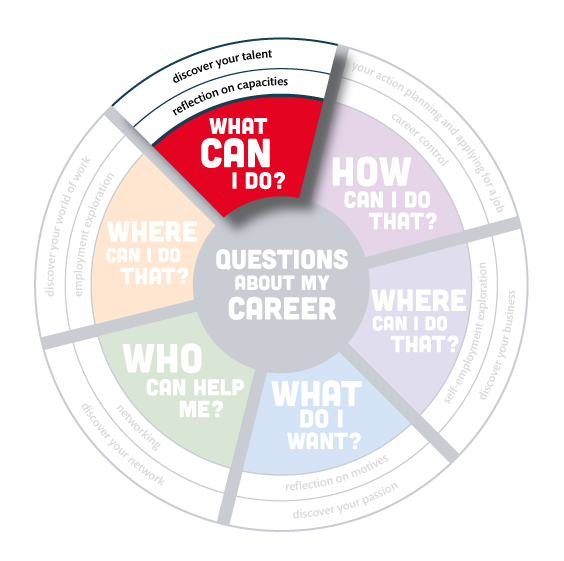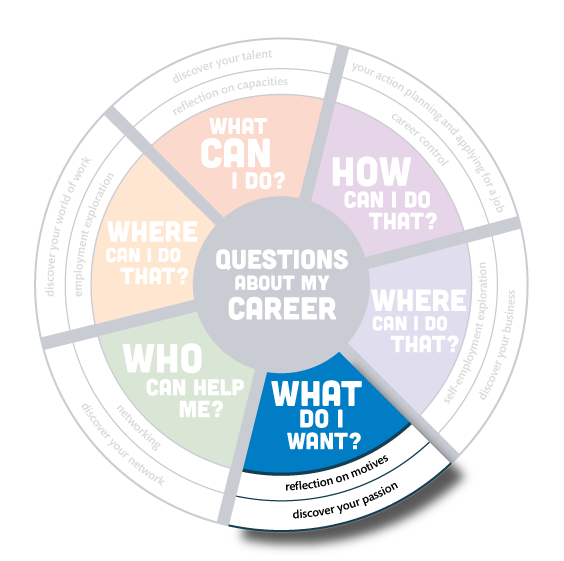Taalkeuze
Bofya hapa kwa toleo la Kiswahili / Click here for the Kiswahilian version
The programme Career Development: how to guide youth to vocational training and (self-)employment?
The Career Development programme enables teachers of secondary schools, trainers of vocational training institutions, companies, NGO’s, the Ministry of Labour, Employment, Elderly, Youth, Women and Children and the Ministry of Education and Vocational Training to select exercises that fit the needs and the level of their groups of youth.
The programme is not intended for youth to work on it independently, without any guidance. Of course, participants get assignments or certain tasks to work on individually, but in general, it is a programme that calls for interaction, cooperation in groups and reflection. It can’t be followed without guidance. Make sure you provide a notebook in which participants can write down their findings and can save their results and progress. On the cover of the notebook, you can put the career compass or participants can design their own front page. Teachers and trainers need to be well prepared, and it is recommended that they reflect on their own career development first. In this way teachers and trainers are also a role model in steering their own career with all the ups and downs.
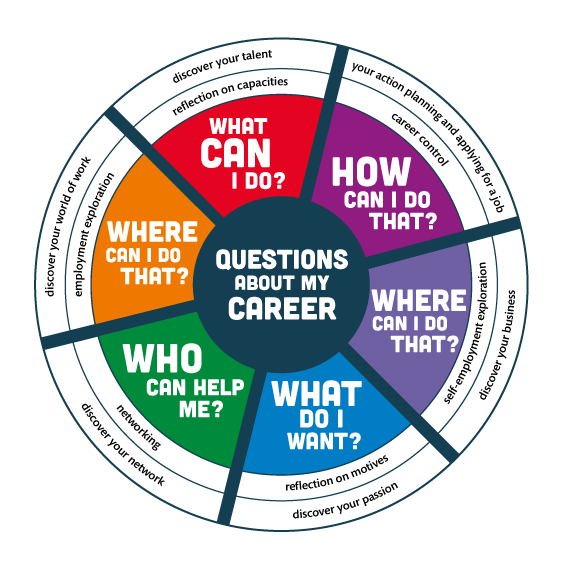
Six career competences and a career compass
The programme ‘Career Development: how to guide youth to vocational training and (self-) employment?’ has been designed around six competences that are important when you want to develop your career:
- Discover your Talent: reflection on capacities, reviewing your own competences with respect to your career;
- Discover your Passion: reflection on motives, reviewing your own wishes and values with respect to your career;
- Discover your World of Work: employment exploration, orientation on your personal values and competences compared to what is required in professional work situations;
- Discover your Business: self-employment exploration, orientation on your aspirations and competences to start a business or to develop a career as an entrepreneur;
- Discover your Network: networking, making and maintaining contacts that are relevant for your career;
- Your Action planning and Applying for a job: career control, career-related planning and self-navigation of your learning and work processes.
Each career competence is connected to a corresponding career question and the total of six competences are represented as a career compass or steering wheel. You need to steer your career steps all the time to find the right direction. In the detailed description of each of the six career competences, you can find more explanation about the competences you need to practice to develop a career.
How to use the programme on Career Development?
Each career competence can be trained by practising several exercises. The exercises differ in content and in method as well. This is fine, as there is more than one way to learn a career competence.
At the beginning of each new topic you will find an overview of all the exercises that belongs to that specific topic. In that overview you always find: the title of the exercise, the goal and a summary of the activating method that will be used in this exercise. In this way you can have just a quick look at all the exercises and this will help you to make a selection that suits you and your group. The best selection is the one that is in line with the career development questions that students/jobseekers and job creators have.
After having scanned the overview, you can zoom into the exercises you have selected. All of them have the same structure. In this way you can easily see how to prepare and deliver an exercise in a proper way.
By making your own selection, teachers and trainers can design a tailor-made programme. You select those exercises that fit the curriculum, the time table of the course and the level of the students/jobseekers and job creators. The choice you make also depends on the questions that students/jobseekers and job creators have about their career.
Teachers and trainers may also choose those exercises they like to facilitate. Some exercises and methods will suit you more than others. The tips that are given at the end of the instruction, are suggestions to facilitate the exercise as good as possible, but feel free to do it in a different way when you think this fits you or your group better.
Of course, you can add your own exercises to this programme. In this way the toolkit will grow and by sharing the exercises with others, career guidance will be delivered even in a better way to the youth of Zanzibar and Tanzania.
Same structure in all exercises
All the exercises are described in more detail, following the same structure. This will help you to prepare and facilitate the exercises you have selected.
The structure is:
Goal: What is the aim of the exercise? What will be the expected result, looking at awareness, behaviour, skills and actions?
Preparation: What to do as a teacher/trainer in career development in order to deliver the exercise in a process-oriented way? How to organise the venue/classroom to give your participants the space they need to carry out the exercises? Some exercises need more space or a different set up of chairs/tables.
Explanation: What can you as a teacher/trainer tell your students/jobseekers and job creators as an introduction to the exercise?
Performance: What is it that students/jobseekers and job creators will have to do or show in the exercise? Here you can find the sequence of the steps that participants take to complete the exercise.
Reflection: Which questions can you ask at the end of the exercise (or after a specific step during the exercise)?
Tips: Things you need to be aware of during the exercise.
Further examination: What more can be done to give the exercise more depth or to link it with another exercise?
Worksheets: Learning aids, materials and instruments that can be used by students/jobseekers and job creators.
Exercises arranged in six topics
The exercises of the programme are arranged around 6 career competences, the so-called six ‘topics’.
Topic 1 ‘Discover your Talent’
In topic 1 you will find 20 exercises about the career competence ‘Discover your Talent’: reflect on your capacities.
Discover your Talent means: thinking about your qualities and how you can use these qualities to develop your career. Students/jobseekers and job creators reflect on the qualities they use in everyday life, at school and at (informal) work. They ask others (graduates, teachers, fellow students, employees, entrepreneurs and family members) to give feedback on what they are good at and on what to improve.
In the overview Topic 1 ‘Discover your Talent’ you can find some exercises in which participants will get to know each other and exercises in which they explore their strong sides. In the overview you find links to the separate exercises so that you can study them in detail. From there you go to the worksheets.
Topic 2 ‘Discover your Passion’
In topic 2 you will find 14 exercises about the career competence ‘Discover your Passion’: reflect on your motivation.
Discover your Passion means: thinking about your aspirations and values that are important for your career. Students/jobseekers and job creators are becoming aware of what they think is important in their life, their education and career. They will discover what gives them a feeling of satisfaction, what they like or dislike and what they (still) need to develop with regard to their ambitions.
In the overview Topic 2 ‘Discover your Passion’ you can click on the separate exercises for more details and from there to the worksheets.
Topic 3 ‘Discover your World of Work’
In topic 3 you will find 24 exercises about the career competence ‘Discover your World of Work’: employment exploration.
Discover your World of Work means: exploring current and future requirements and values in the profession you aspire. Students/jobseekers and job creators develop the skill to find work/a job that corresponds to their personal values. They learn how to find a balance between the prevailing standards/values of the work place and their talents/personal values. Employment exploration is about getting a taste of the reality of the world of work.
In the overview Topic 3 ‘Discover your World of Work’ you can click on the separate exercises for more details and from there to the worksheets.
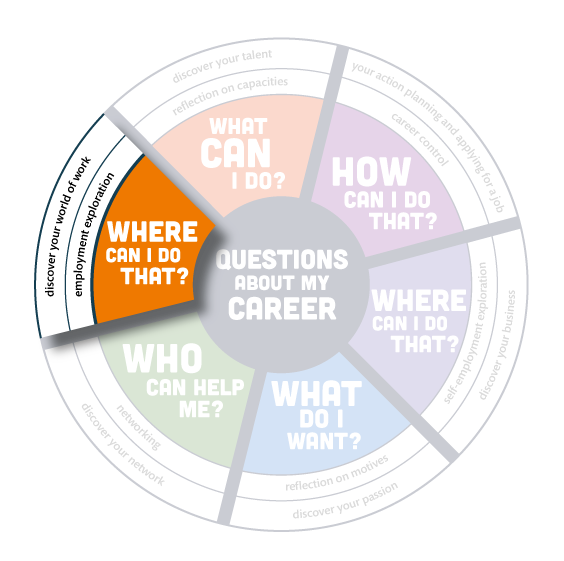
Topic 4 ‘Discover your Network’
In topic 4 you will find 21 exercises about the career competence ‘Discover your Network’: networking.
Discover your Network means: identifying your network, building and maintaining it, so that you can develop your career in the best way possible. Students/jobseekers and job creators develop the skill to use their network in such a way that they first can obtain a place in the job market and later on can maintain or change it. They learn how to communicate about what they want and need for their career.
In the overview Topic 4 ‘Discover your Network’ you can click on the separate exercises for more details and from there to the worksheets.
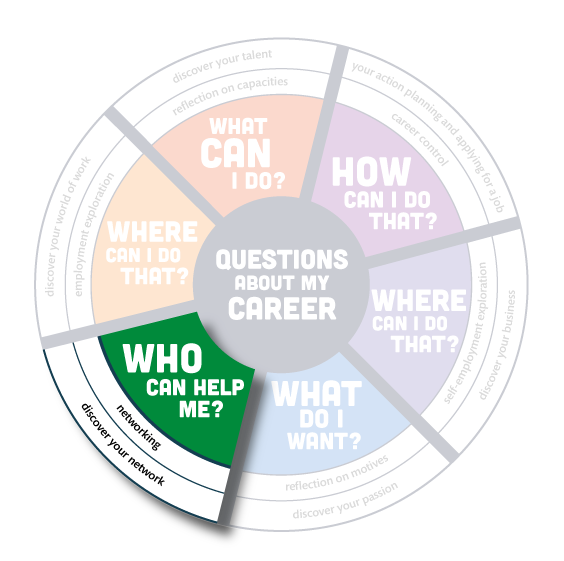
Topic 5 ‘Discover your Business’
In topic 5 you will find 24 exercises about the career competence ‘Discover your Business’: self-employment exploration.
Discover your Business means: exploring whether you would like to start your own business and develop your career as an entrepreneur/business(wo)man. Students/jobseekers and job creators learn the meaning of how to behave in an entrepreneurial way, how to develop a clear vision about the enterprise they want to start and how to build up skills to make that vision concrete. They learn to set entrepreneurship in motion.
In the overview Topic 5 ‘Discover your Business’ you can click on the separate exercises for more details and from there you can go to the worksheets.
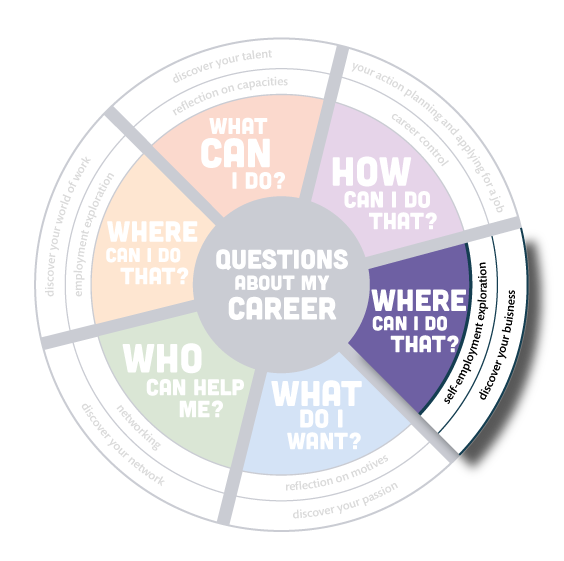
Topic 6 ‘Your Action planning and Applying for a job’
In topic 6 you will find 30 exercises about the career competence ‘Your Action planning and Applying for a job’: controlling your career.
Action planning and Applying for a job means: planning, controlling and adapting your way of learning and working, with the intention to streamline your career development. Students/jobseekers and job creators develop the skill to take initiative and responsibility. They acquire the skill to obtain, keep or change their position in the job market. They learn how to find a job, how to create a CV, and how to conduct an interview.
In the overview Topic 6 ‘Your Action planning and Applying for a job’ you can click on the separate exercises for more details and from there you go to the worksheets.

